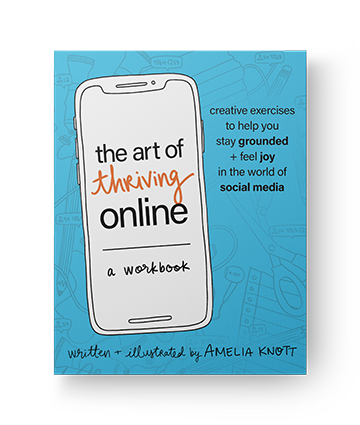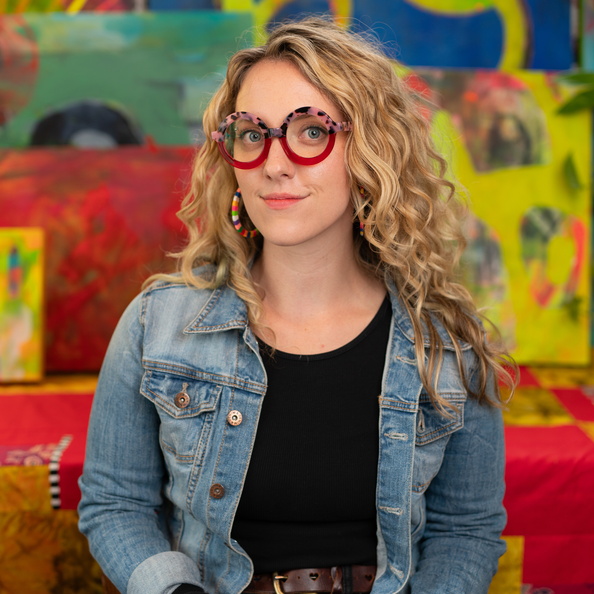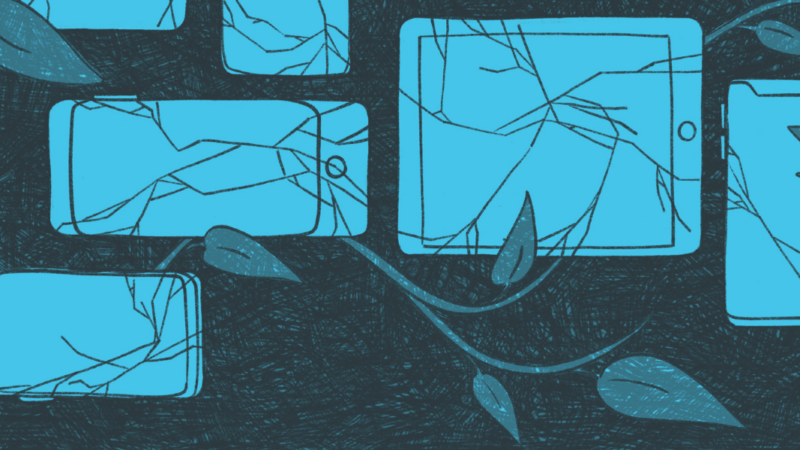Amelia Knott is an art psychotherapist who specializes in the mental health impacts of hustle culture and social media. In the video below (3:22 minutes), she shares her inspiration behind her written and illustrated workbook, The Art of Thriving Online: Creative Exercises to Help You Stay Grounded and Feel Joy in the World of Social Media and invites you in on the journey of reimagining a healthier relationship with the digital world.
You can also read the video transcript below:
It’s been half my life—literally half the years of my life—lifting my chin for pictures, anticipating the critical gaze of a digital audience, offering my presence half-heartedly to the world around me to to draft a clever caption, choose a flattering filter, and watch as my phone tells me if this time my work will be rewarded with worthiness.
Too many nights avoiding myself, letting the blue-light-lullaby of my screen become a substitute for true soothing. It’s been half my life; holding up the mirror of comparison to everyone’s best days and hottest takes, highlight reels curated with effortless nonchalance, and now the mirror of comparison to a perfected self made in the algorithm’s image. It’s been half my life of fractured attention, commodified vulnerability, fury, and fear taking turns with despondence.
What if my real life stopped being my body or the land, and became the non-place I devote my hours to?
And it’s been half my life wandering daily into the galleries of artists’ and thinkers’ most beautiful ideas. Half my life keeping far-away loved ones close.
It’s true that the Internet gave me my career, my marriage. It made visible the threads of similarity across a quickly dividing globe. It showed me life-saving examples of people who survived what I needed to survive and it broke my heart open at the things no one should have to.
I like to misquote Carl Jung when he said something almost like “a paradox is our most valuable spiritual tool.” I’m not interested in finding the elusive, singular hack that will make screen time less alluring forever. I’m not interested in a lifetime of cycling through eras of detox and excess. Vacillating between the high of a new regimen and the crash of shame when social media works once again, exactly as it was designed.
I’m a therapist. I know that hacks can be tools, or bandaids. A self-help, step-by-step, sales pitch plan can feel like salvation, but it’s not the medicine of being in an evolving conversation with yourself. I am more interested in making art. I’m more interested in learning to tolerate the tension between social media’s danger and its magic. I’m more interested in learning to like myself, unsolved.
And when I’m learning the same lesson, again, the hard way, I know that my allies in finding safe passage through the digital age are art and writing. Creativity is how we imagine a different future.
So I wrote us this book. It’s a place to start that conversation with yourself about what is really happening between you and your screen; who profits from the ways it harms you, and how to protect the parts of it that are genuinely good, because parts of it are.
So if you are ready to join me—an art psychotherapist who both loves the life her phone enables and desperately needs to put it down—we’ll make some art. We’ll sit in the stunning and maddening paradox, and we’ll find creative ways to author our own definitions of real wellbeing when we choose to be on social media.
And together we’ll find the art of thriving online.

The Art of Thriving Online: A Workbook








